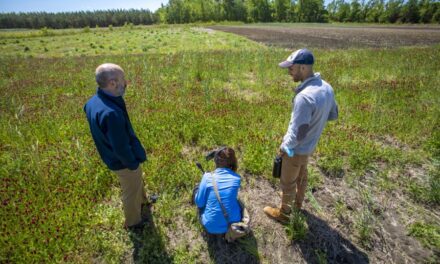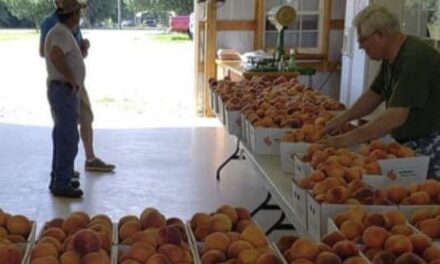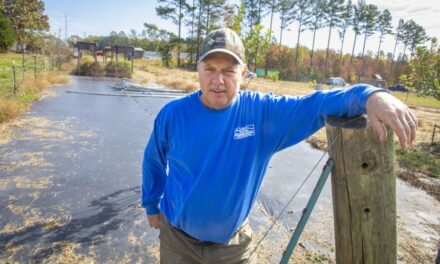Small Farms Leadership 360 Gives Growers Tools and Knowledge for Success

Lisa Hinton walks along Bethesda Church Road near her property behind historic Bethesda Presbyterian Church near Locust Hill in western Caswell County. Hinton comes from a large family that has farmed land in this area of Caswell County since 1921.
Lisa Hinton comes from a large family that has farmed land in Caswell County since 1921.
Many of the 15 children of her great-great grandmother Elizabeth “Moore” Garrison Simpson worked as tenant farmers or made a living as farm workers, but over the years, most have left farming and Hinton felt isolated as she tried to maintain the small farm that she took over from her parents in 2015.
“You can’t be in this industry alone and my family isn’t really involved anymore,” said Hinton, a graduate of N.C. A&T and an A&T project manager who farms part time. “That’s why It’s so been great to interact face to face. I don’t feel like I‘m alone trying to figure things out.”
That face-to-face interaction was made possible by a program called the Small Farms Leadership 360 Initiative. The hands-on educational program assists farmers with small operations in limited-resource counties. The goal is to help small and minority farmers succeed and navigate the challenges associated with growing and marketing crops, maintaining farmland, and running a business.
“The Small Farms 360 Leadership program takes great information on agricultural production, research, and business from the best faculty and partners we have and gets it into the hands of small and minority growers across the state,” said Mark Blevins, assistant administrator for agricultural and natural resources for Cooperative Extension at N.C. A&T. “I want to see farms thrive and grow as a result of this experience, and I want to see growers connecting with and relying on each other because of what they have been through together and the challenges they have overcome collectively.”
The program launched in February 2022 with a two-day learning module focused on farm management, marketing, finances and loans, and protecting against land loss. A second module, held in June 2022, covered small farm sustainability, including post-harvest best practices, wholesale readiness, and introducing farmers to resources such as the Farmers of Color Network and USDA Farm Service Administration.
“The Zoom modules were very good,” said Hinton, referring to the online learning offered in February. “But the fact that we were able to come together face to face in Kannapolis (in June) was incredible. I learned about other programs through Extension. I learned about funding and making connections with the people who have knowledge and can get me engaged.”
The third module of the Small Farms 360 Initiative was held in October, 2022 and a fourth module was held in Februrary 2023. The Extension at A&T Small Farms Task Force launched the initiative after convening focus groups to better understand the needs of small and minority farmers in underserved counties. The program aims to give small, limited-resource farmers not only the abilities to be successful producers, but the skills to manage their businesses, negotiate, and make connections to enhance their success.
“Everything you do is about networking,” said James D. Oliver, Ph.D., Extension at A&T’s small farms coordinator. “Everything you do in your life – I don’t care if you’re talking to your partner about buying a car or buying land, you’re negotiating with someone else. The better you are at it, the easier it is to transition through life. You even learn how to negotiate with different people because of their cultural background.”
Hinton, who currently has fruit trees and cover crops on her farm and hopes to expand by bringing water to the site, agreed that making connections is critical for small farmers. She said the faculty researchers, legal and marketing experts, and government representatives she has met through Small Farms 360 have motivated her to pursue Good Agricultural Practices (GAP) certification and explore the possibilities of launching a Community Supported Agriculture (CSA).
For Hinton, Small Farms 360 has inspired a wealth of ideas. She invited a community garden leader and pantry worker to attend the June sessions with her, who used the opportunity to learn and make connections. She’s like to see the program expand to include community gardeners, students and those interested in equitable food access. And she’d like to work with Extension’s Small Farm Task Force members to attract new blood into farming, including younger people and women.
“My personal goal is to get a CSA operational and recruit farmers from the 360 Initiative into it,” said Hinton. “And I’d like to figure out how we can tap into each other’s collective resources to support each other.”



